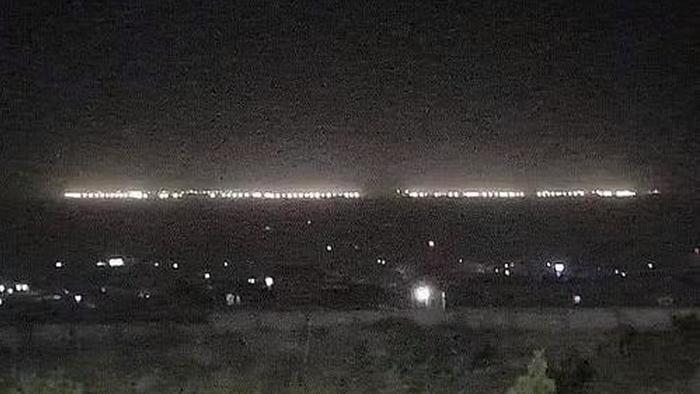Reports Of Military Planes At Bagram Air Base Fuel Speculation Of Chinese-Afghan Alliance
By Blue Apples
Months ago, Bagram Air Base became center stage of the calamitous withdrawal of U.S. forces from Afghanistan. Since then, foreign policy experts have opined that it will unveil the next act of that tragedy in welcoming growing Chinese interest in Afghanistan. Now, the page has been seemingly turned onto that chapter. This morning, it appears the next stage of that plan may be unfolding following multiple confirmed reports of planes landing at the airfield across social media and mainstream outlets.
Reports claim that the floodlights have turned on at Bagram Air Base for the first time since U.S. troops departed the nation, marking the resumption of its operations.
The capitulation which placed Bagram Air Base into the hands of the Taliban was enabled by the Biden Administration departing from a component of the Trump-era withdrawal plans that included keeping a contingent of 800 or so special military operatives to work with Afghan Special Forces aimed at curbing the resurgence of the Taliban and other terrorist cells in the country. In the absence of that coordinated effort, Bagram fell from U.S. control before forces could be withdrawn, resulting in a catastrophic departure from the country that has marked the low point of the Biden Administration thus far.
Though none of those reports have been able to confirm that the planes landing at Bagram belong to the Chinese army, their arrival follows the resumption of power at the airfield for the first time since U.S. forces departed in August. The resumption of operations at Bagram follows Taliban forces blocking off public access to the Chinese Embassy in Kabul. The fortification of that embassy is reported to have been in advance of meetings between Taliban Interior Minister Sirajuddin Haqqani and Chen Wenqing, the Minister of State Security for the Chinese since 2016. Wenqing's reported presence in Kabul comes weeks after another head of intelligence was spotted in Kabul when Pakistani ISI Chief Faiz Hameed had arrived in the capitol to meet with his country's own ambassador to Afghanistan. The Taliban's Acting Foreign Minister also met with China's Ambassador to Afghanistan preceding Wenqing's reported visit. Despite the apparent resumption of operations at Bagram, Taliban officials have shot down the notion that any Chinese security forces or planes have landed at the air base since then.
Since long before the Taliban solidified its takeover of Kabul, Chinese officials had been crafting a foreign policy plan which embraced the rule of the extremist sect. That approach is a component of diplomatic engagement with Afghanistan that has been an obvious multi-faceted and long-term strategy of the Chinese as they anticipated the inevitable U.S. withdrawal from the longest theater of war in its history. Wenqing's diplomatic engagements with Afghan officials predate the installation of the Taliban-led government, as the Chinese security chief previously met with the National Security Advisor to the previous Afghan government, Hamdullah Mohib, in Tehran back in 2019. In addition to expanding its military presence in the region, China is especially motivated to capitalize on the availability of the vast mineral resources Afghanistan holds. Fostering a positive relationship with the Taliban is imperative to that. Chinese mineral rights in Afghanistan go back to 2008, when the country hashed out a thirty-year lease on the Mes Aynak Copper Mine through its state-owned enterprises China Metallurgical Group Corporations ("MCC") and Jiangxi Copper, the country's largest copper producer. MCC merged with China's largest iron and steel trader China Minmetals Corporation in 2015. The transition of power to the Taliban this summer makes efforts for Chinese officials to forge a diplomatic relations essential to preserving those pre-existing mineral rights agreements in addition to expanding their access to other vital resources.
Diplomacy between the Chinese and the former government of the Islamic Republic of Afghanistan had soured earlier this year following the December 2020 arrest of Chinese spies who were reportedly working with a covert intelligence network led by the aforementioned Sirajuddin Haqqani, who has gone from a clandestine terrorist operating in Afghanistan to leading the country's Interior Ministry, highlighting the long-standing relation between him and the Chinese intelligence apparatus. This scandal resulted in the previous Afghan government severing several oil and gas contracts with the Chinese. Previously the China National Petroleum Corp. had signed a billion dollar contract with the Afghan government for drilling and refining oil in the country's Amu Daya basin but that deal had been voided by the previous Afghan regime. Given Haqqani and the Taliban's ascent into power, it's possible that these deals will be rehashed.
The clear incentive for the Taliban to advance its diplomacy with the Chinese lies in its need to strengthen its security apparatus in Afghanistan to keep its government viable. This is evident from reports of Chinese state officials contemplating an outright takeover of Bagram. With the Taliban seizing over $84 billion in U.S. combat equipment, that presents the risk of the Chinese government to reverse engineer everything from Humvees to Black Hawk Helicopters. With the World Bank predicting a 20% decline in foreign aid to Afghanistan following the Taliban takeover, economic investment from China would greatly help with filling that void. Similar regional report from Iran, Pakistan, and Tajikistan marks the nascent efforts to create a new geopolitical axis where the middle east meets the far east in support of future Taliban hegemony in Afghanistan. While the U.S. has removed itself from Afghanistan for the first time in nearly 20 years, this burgeoning new alliance makes from the next chapter of an occupation that will haunt the country for much longer. Tyler Durden Sun, 10/03/2021 - 14:01
http://dlvr.it/S8rLcg

No comments:
Post a Comment